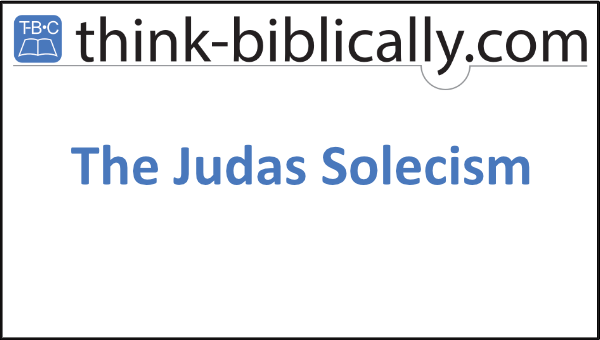By Tyson Thorne

John 12 and Mark 14 tell of an awkward moment at an intimate dinner party. The dinner takes place at the home of Lazarus (following his raising from the dead) and his sisters Mary and Martha. After dinner, Mary begins to anoint Jesus’ head and feet with an expensive oil made of nard. Judas objects to this compassionate display, arguing that the oil should have been sold and the money given to the poor. Jesus rebukes this notion, stating Mary has chosen the greater good. There is a lot to unpack in this short scene.
Judas proposes a redistribution of wealth, from an individual (Mary) to a larger group that is in need. I find it interesting that such a concept is quickly denounced by Jesus. Throughout the Bible, from very early times, the concept of personal property is reinforced. Perhaps the earliest evidence of this is found in Exodus 20 and the Ten Commandments. “Thou shalt not steal” is clearly an indictment of wealth redistribution. But this is not Judas’s great error.
John tells us that Judas’ intensions were far from altruistic. He really wanted that money for himself. As the treasurer for Jesus’ disciples, he was known to increase his own wealth by taking from the money meant for the team. In other words, while he espoused a social justice principle he was really looking for a way to add to his own personal wealth. This is all too often the case even in today’s world. It’s why the organization Black Lives Matter is under investigation by California’s justice department. BLM has collected tens of millions of dollars, but taxes have not been paid. Where did all that money go?
So what was Judas’ solecism? His great error? Judas mistakes one compassionate act as being better than something that is actually greater. In other words, he mistakes a good act of compassion for the greatest. Jesus speaks to us from John 12: “Leave her alone. She has kept [the oil] for the day of my burial. For you will always have the poor with you, but you will not always have me!” (NET). Glorifying God is always greater than anything else we might do.
Like me, I’m sure you have seen churches in your city that fly a rainbow banner out front. These churches believe that the greatest compassionate act one can show to the LGB+ community is acceptance. Acceptance of someone as a sinner struggling toward righteousness is a good thing, acceptance of their sin is not. To break the word of God and declare acceptable what God has despised might appear to be compassionate; it does make people feel good about themselves. Yet such false compassion is a gateway to hell. In such a circumstance, clearly teaching God’s word on all subjects is truly compassionate, for it brings salvation to the lost.
How do we know what is the greater good? How do we discern false compassion for true? The answer comes to us from Isaiah 48 verses 17 and 18:
This is what the LORD, your protector, says, the Holy One of Israel: “I am the LORD your God, who teaches you how to succeed, who leads you in the way you should go.
If only you had obeyed my commandments, prosperity would have flowed to you like a river, deliverance would have come to you like the waves of the sea.
The key is to obey God’s commands. We are meant to follow the path God gives us, not our feelings. It is a lesson Judas never learned and, for that reason, he eventually became God’s betrayer.
|
|
